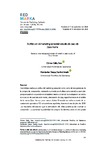Mostrar o rexistro simple do ítem
El olfato en el marketing sensorial: estudio de caso de Zara Home
| dc.contributor.author | Gómez Gallo, Sara | |
| dc.contributor.author | Hernández Zelaya, Sandra Lizzeth | |
| dc.date.accessioned | 2021-05-07T11:22:45Z | |
| dc.date.available | 2021-05-07T11:22:45Z | |
| dc.date.issued | 2020-12-31 | |
| dc.identifier.citation | Gómez Gallo, S., & Hernández Zelaya, S. L. (2020). El olfato en el marketing sensorial: estudio de caso de Zara Home . Redmarka. Revista de Marketing Aplicado, 24(2), 201-2016. https://doi.org/10.17979/redma.2020.24.2.6986 | es_ES |
| dc.identifier.issn | 1852-2300 | |
| dc.identifier.uri | http://hdl.handle.net/2183/27904 | |
| dc.description.abstract | [Resumen] Este trabajo realiza un análisis del marketing sensorial como parte de la experiencia de la compra del consumidor, centrando su interés en el olfato como sentido a estimular, para persuadir al consumidor en el establecimiento comercial. La investigación se centra, en el sector de una marca de moda y decoración de casa, específicamente en el análisis de la marca Zara Home, como marca olfativa. El estudio se realiza a través de un cuestionario aplicado a 152 consumidores españoles, durante el mes de julio del 2020. Los resultados demuestran que la estimulación del olfato puede ayudar a atraer al consumidor y a aumentar la posibilidad de compra. Se identifica cómo el olor puede facilitar el recuerdo de marca, asociarse a determinados olores y generar sentimientos y emociones. Se concluye con la importancia del olor para la marca, como parte de la estrategia de marketing, no solo para captar la atención del consumidor, sino también para fidelizarle. | es_ES |
| dc.description.abstract | [Abstract] This article examines the role of sensory marketing as part of customers’ shopping experience, focusing on the use of scents to catch their attention and persuade them to buy the products on sale. The study looks at scent branding at the fashion and home décor chain, Zara Home, based on a questionnaire survey of 152 Spanish consumers during the month of July 2020. The results show that stimulating sense of smell can help to attract consumers and make them more likely to purchase. The findings also reveal the effect on smell on increased brand recall, creation of associations and generation of feelings and emotions. The conclusions of the study highlight the importance of scent branding as part of a company’s marketing strategy, not only to capture the customer’s attention but also to build brand loyalty. | es_ES |
| dc.language.iso | spa | es_ES |
| dc.publisher | Universidade da Coruña | es_ES |
| dc.relation.uri | https://doi.org/10.17979/redma.2020.24.2.6986 | es_ES |
| dc.rights | Atribución-CompartirIgual 4.0 Internacional (CC BY-SA 4.0) | es_ES |
| dc.rights.uri | https://creativecommons.org/licenses/by-sa/4.0/deed.es | |
| dc.subject | Marketing sensorial | es_ES |
| dc.subject | Marketing experiencial | es_ES |
| dc.subject | Proceso de compra | es_ES |
| dc.subject | Olfato | es_ES |
| dc.subject | Odotipo | es_ES |
| dc.subject | Sensory marketing | es_ES |
| dc.subject | Experiential marketing | es_ES |
| dc.subject | Purchasing process | es_ES |
| dc.subject | Sense of smell | es_ES |
| dc.subject | Scent logo | es_ES |
| dc.title | El olfato en el marketing sensorial: estudio de caso de Zara Home | es_ES |
| dc.title.alternative | Sensory Marketing and Sense of Smell: A Case Study of Zara Home | es_ES |
| dc.type | info:eu-repo/semantics/article | es_ES |
| dc.rights.access | info:eu-repo/semantics/openAccess | es_ES |
| dc.date.updated | 2021-05-04T12:53:22Z | |
| UDC.journalTitle | Redmarka. Revista de Marketing Aplicado | es_ES |
| UDC.volume | 24 | es_ES |
| UDC.issue | 2 | es_ES |
| UDC.startPage | 201 | es_ES |
| UDC.endPage | 2016 | es_ES |
| dc.identifier.doi | 10.17979/redma.2020.24.2.6986 |
Ficheiros no ítem
Este ítem aparece na(s) seguinte(s) colección(s)
-
REV - REDMARKA - Nº 24 (2), 2020 [16]
Este número incluye un monográfico sobre nuevas narrativas del marketing de influencia en moda






